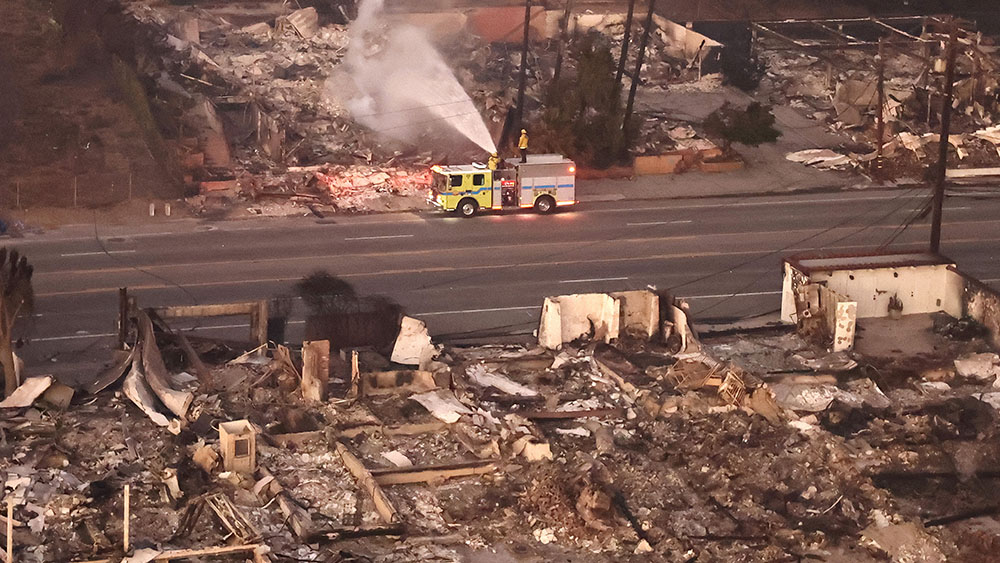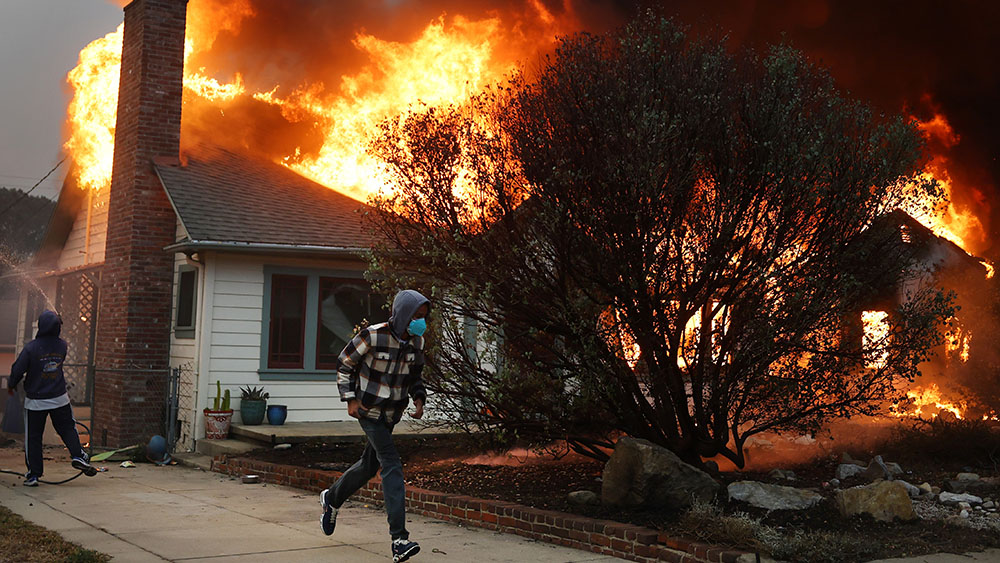 Parler
Parler Gab
Gab
- Landlords and property managers are dramatically increasing rental prices in Southern California, with some listings doubling or tripling in cost, as wildfires displace tens of thousands of residents.
- Over 105,000 people are under evacuation orders, and more than 12,300 structures have been destroyed, creating a severe housing shortage and exacerbating existing affordable housing issues.
- California Governor Gavin Newsom issued an executive order capping price increases at 10% above pre-disaster rates, while the state attorney general launched investigations into reports of price gouging.
- Insurers are withdrawing from high-risk areas, leaving many residents without coverage or facing increased premiums, compounding the housing crisis.
- Community advocates and officials are urging residents to report violations and are condemning predatory practices as "unacceptable and illegal," emphasizing the need for support during recovery.
A crisis of exploitation
The fires, which have claimed more than 20 lives and destroyed over 12,300 structures, have created a dire housing shortage. In upscale neighborhoods like Pacific Palisades, where celebrities such as Billy Crystal and Kate Beckinsale once resided, even those whose homes survived the flames are under mandatory evacuation orders. This has created a fertile ground for opportunists. Lieberman recounted her experience with a Santa Monica property listed at $17,000 per month. When she inquired, the agent demanded $30,000, citing multiple cash offers from other applicants. “They told me they have people ready to offer more and pay cash. It’s absolutely insane,” she said. Similar stories are emerging across the region. A Beverly Hills rental home previously listed at $14,000 per month saw its price jump by $4,000 overnight—a nearly 30% increase. The realtor justified the hike as a reflection of “supply and demand.” California Governor Gavin Newsom responded to the crisis on Sunday by issuing an executive order capping price increases at 10% above pre-disaster rates. State Attorney General Rob Bonta has launched multiple investigations into reports of price gouging, urging the public to provide evidence such as screenshots, text messages and emails. “This is just unimaginable conduct during this time when people need the exact opposite of being preyed on, exploited, victimized,” Bonta said at a news conference. “They need support and healing and help.”A broader housing crisis
The wildfires have exacerbated an already strained housing market. Magdaleno Rosales, an organizer with the Los Angeles Tenants’ Union, reported receiving more than 450 tips about price gouging, with some rents increasing by over 100%. For many, the soaring costs are insurmountable. Joe Thompson, a Pacific Palisades resident forced to evacuate, discovered a five-bedroom home in Santa Monica listed for $28,000 per month—more than double its previous rate. Despite his home surviving the fires, its future remains uncertain, leaving Thompson and his family among thousands searching for housing in a market with few options. The crisis is not limited to high-income areas. Working-class renters are also struggling to find affordable housing, with many facing bidding wars, waiting lists, or demands for up to a year’s rent in advance.Insurance challenges compound the crisis
Adding to the turmoil, homeowners are grappling with a growing insurance crisis. As insurers withdraw from high-risk areas, many residents are left without coverage or facing skyrocketing premiums. State Farm, Allstate and Farmers Insurance have all reduced their presence in fire-prone regions, forcing homeowners to turn to the California FAIR Plan, a state-backed program offering limited coverage at higher costs. Early estimates suggest insured losses from the wildfires could reach $30 billion, further straining an already fragile system.A call for accountability
As investigations into price gouging continue, officials are urging residents to report violations. State Assemblymember Jacqui Irwin condemned the predatory practices, calling them “unacceptable and illegal.” For displaced families like Lieberman’s, the road to recovery remains uncertain. “There are really good people who are compassionate, sympathetic, empathetic, and they want to do something to help,” said one LA resident searching for housing for his family of five. “And then there are others who… smell an opportunity to profit, and that’s what I encountered.” In the face of tragedy, the wildfires have revealed both the resilience of communities and the darker side of human nature. As Los Angeles begins to rebuild, the fight against exploitation and greed remains a critical part of the recovery process. Sources include: InfoWars.com CBSNews.com LatinTimes.comCIA busy polishing its Ukraine legacy
By News Editors // Share
Hamas’ RESILIENCE in Gaza complicates path to lasting peace after ceasefire
By Kevin Hughes // Share
A PULPIT for POLITICS: Bishop Budde’s woke sermon at the National Prayer Service sparks outrage
By Willow Tohi // Share
Zelensky demands U.S. troops put their lives on the line in Ukraine for peace deal
By Cassie B. // Share
Governments continue to obscure COVID-19 vaccine data amid rising concerns over excess deaths
By patricklewis // Share
Tech giant Microsoft backs EXTINCTION with its support of carbon capture programs
By ramontomeydw // Share
Germany to resume arms exports to Israel despite repeated ceasefire violations
By isabelle // Share










